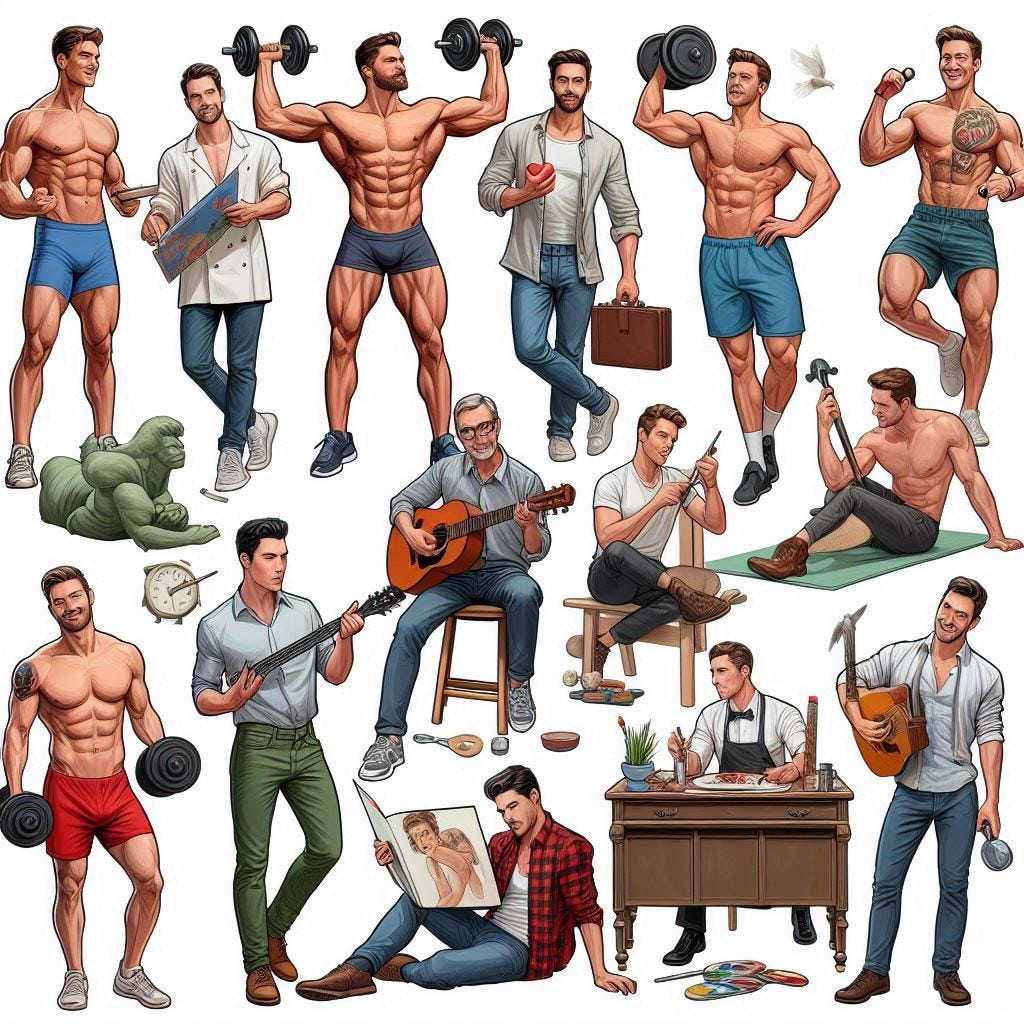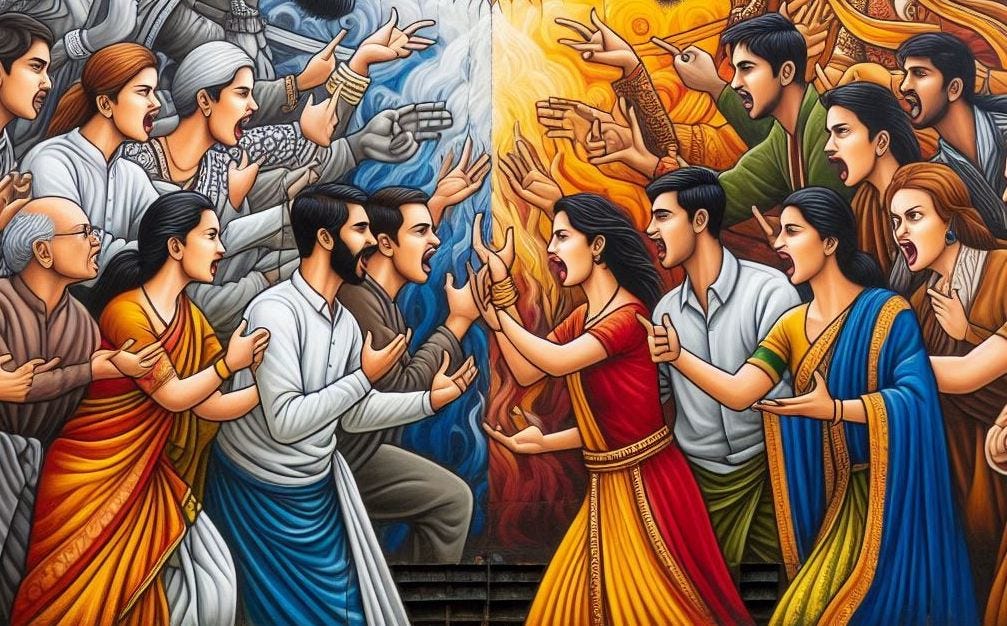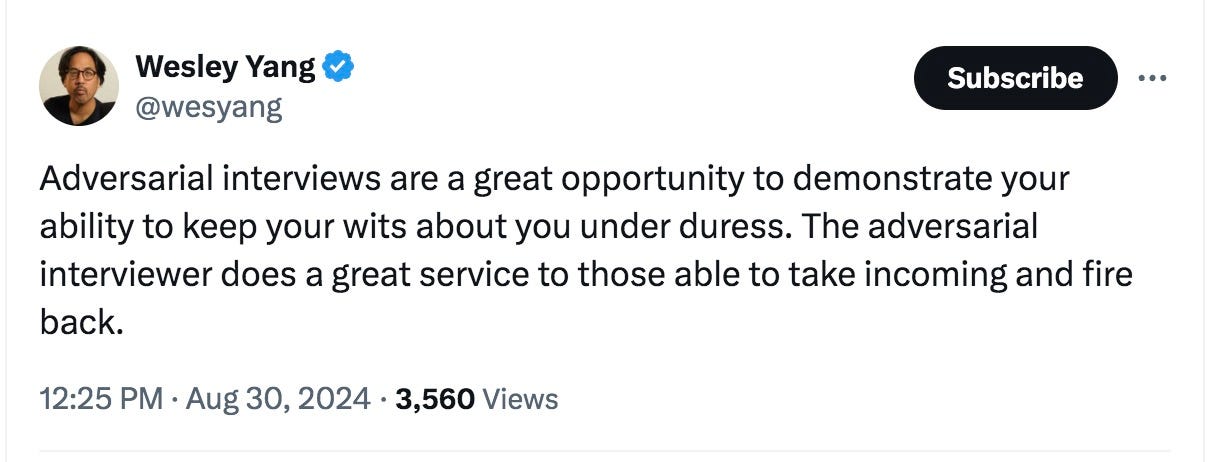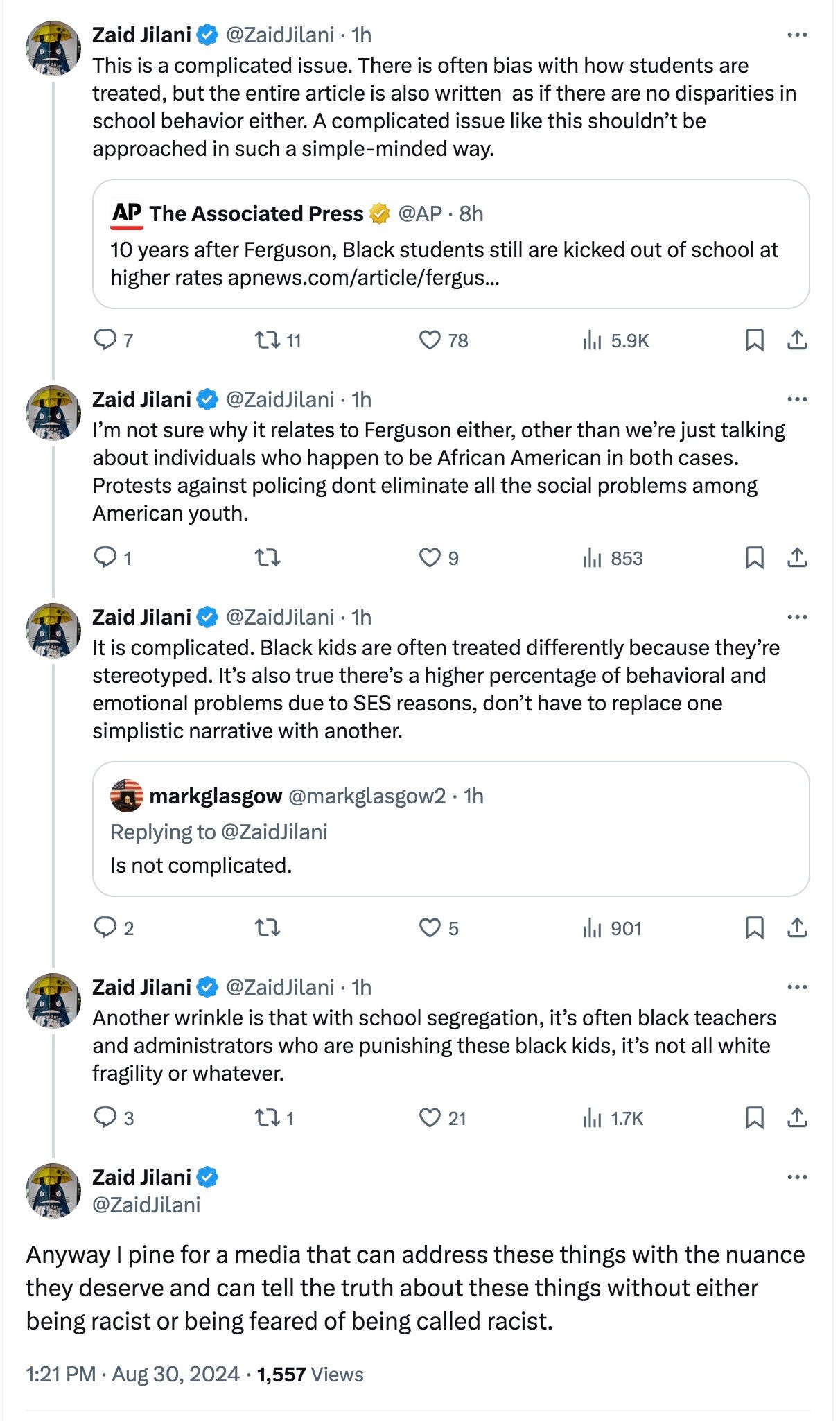E-Pluribus | August 30, 2024
Manning up, 2024 style; the rise and fall of woke capitalism; and the state of the culture wars in 2024.
A round-up of the latest and best musings on the rise of illiberalism in the public discourse:
Joe Pitts: Masculinity in an Age of Individualism
Even without the “what is a man/what is a woman” questions of the gender debates, more women in higher positions of power and influence are giving rise to questions about today’s definition of masculinity. At The Dispatch, Joe Pitts addresses the reasons for the reexamination of manhood and how individuals across the political and ideological spectrum can better address the issue.
Over the last half-century, American men have undergone a transformation.
[. . .]
These shifts—growing anomie, declining workforce participation, reduced attachment to institutions like family—have borne bitter fruits. Men have fallen far behind women in postsecondary achievement and even K-12 academic performance. They suffer from drug addiction, deaths by suicide, and depression at alarming rates. And men and women are increasingly “going it alone,” uninterested, unwilling, or unable to find a long-term partner, let alone a spouse.
Masculinity in 21st-century America, then, often means being lethargic, alienated, and afraid to form intimate bonds. That’s been the trend for the last 50 years at least, with little sign of change.
[. . .]
Defenders of traditional forms of social organization are used to describing institutions like marriage and religion in terms of how they sculpt our desires, polishing rough edges and redirecting our energies toward the good. But in our time, as political theorist Yuval Levin has pointed out, institutional breakdown has left many young people vulnerable to a sort of “disordered passivity.”
The problem is that these fading institutions often summon manhood. They ask and respond to the question, “What does it mean to be a man?” And they do so not through public argument but through the obligations they establish, the roles they forge. Manhood is more than a concept floating in the void of intellectual discourse; it’s grounded in real institutions and embodied by real people. Put another way, manhood is defined not primarily by colloquy nor personal whim, but by the people, places, and institutions that demand something from us as men.
Strong marriages demand that men, as husbands, care for and love their spouses. Strong families demand that men, as fathers, dedicate substantial time to raising their children and putting loved ones before themselves. Strong religious communities demand that men, as congregants, love the other. These mutual obligations swim against the current of hyperindividualism, shaping us into better people and better men, calling us out of ourselves and teaching us that there’s more to life than endless self-seeking.
[. . .]
[A]ny approach to the malaise confronting men will first demand that we reorient ourselves toward obligation and formation. Before enumerating to-do items or formulating action plans, we must commit ourselves—again and again—to living for more than base self-satisfaction. Manhood is not worthy of its name if its lodestar is “self-discovery” or the pursuit of pleasure. To be a man is to nurture, strengthen, and fulfill one’s obligations to others, especially those whom we are bound to through institutions like marriage, family, and faith. Manhood is a rite of passage, not a right of birth.
While the instruction of male role models is a good start, this education must ultimately be embodied in traditions and institutions that actually demand something of men. These social structures encompass religious communities, fraternal organizations, sports clubs, and a plethora of other institutions. Joining such organizations, and dedicating even just a few hours a week to their efforts, is integral to solving the unique problems facing men and boys in the 21st century.
Read it all here.
Wall Street Journal Editorial Board: Business Backs Away From DEI
Every day seems to bring a new story about a company walking back its “diversity” programs. This week, the editorial board of the Wall Street Journal highlighted (and cheered) this trend.
Progressives pioneered the strategy of using activist campaigns to change corporate policies, and now they’re learning the other side can do the same. More companies are backing away from diversity, equity and inclusion policies amid new public scrutiny, and the distiller Brown-Forman illustrates the trend.
In an internal company email shared on social media by conservative Robby Starbuck, the Brown-Forman Corp. Executive Leadership Team wrote that since it launched its diversity initiatives in 2019 “the world has evolved, our business has changed, and the legal and external landscape has shifted dramatically, particularly within the United States.”
Brown-Forman’s email said it will end “quantitative workforce and supplier diversity ambitions,” also known as race-based hiring, contracting and promotion. It will also end “participation in the Human Rights Campaign’s Corporate Equality Index Survey.” This politicized index scores companies’ LGBTQ+ “workplace inclusion,” including categories on “transgender workplace best practices” and “corporate social responsibility.”
[. . .]
The Brown-Forman shift follows similar rollbacks at Harley-Davidson Inc., Deere & Co. and Tractor Supply Co., which withdrew their major DEI initiatives this summer. Lowe’s Cos. announced similar changes on Monday and Ford Motor Co, did so on Wednesday.
Brown-Forman’s decision comes amid a campaign by Mr. Starbuck to call out corporations that have adopted progressive woke policies. He said on the X website that he was set to expose the Brown-Forman workplace policies and the company “preemptively announced that they’ll be making these changes.”
[. . .]
More companies could find themselves under similar scrutiny. Many CEOs have bent in recent years to progressive pressure to adopt race-based hiring practices. Covington & Burling counsel and former Attorney General Eric Holder has a major sideline helping companies conduct civil-rights assessments to implement DEI policies.
[. . .]
Companies are wise to re-examine their policies even without the political pressure. CEOs and corporate boards are obliged by law to have neutral hiring practices that don’t discriminate by race, gender and so on. Progressives have leaned on business to abandon this neutrality in favor of discriminating by race.
Read the whole thing.
Juan Perez Jr. and Andrew Atterbury: Are Republicans losing the culture wars?
Wars are made up of many battles, and in this election season, Juan Perez Jr. and Andrew Atterbury of Politico have written an update on some of the culture war flashpoints that might be concerning to Republicans. Florida under Ron DeSantis has been a leader in pushing back against institutional progressive control and influence in the state, but Perez and Atterbury suggest opponents are making headway.
Republicans are confronting a decisive moment in the battle over public education: proving they can still win a culture war.
School board candidates backed by Moms for Liberty, a conservative vanguard whose members popularized restrictions on classroom library books, are losing elections in Florida and some swing states. Republican leaders who rallied against critical race theory and LGBTQ+ issues recently faced recalls in red pockets of California.
[. . .]
“We’re in the middle of a cultural revolution in America, and one of the biggest battlegrounds is the schools,” Moms For Liberty co-founder Tiffany Justice said in an interview. “We didn’t start this fire, but we’re going to put it out.”
Karoline Leavitt, a Trump campaign spokesperson, said there is “a lot of mutual consensus” between the Republican nominee’s beliefs on education “and what Moms for Liberty stands for.”
But several Democratic National Committee speakers found ways to leverage social issues, including Walz, a former teacher who used them to pivot to a law he signed as Minnesota governor providing free school meals to all students.
“We made sure that every kid in our state gets breakfast and lunch every day,” Walz said Wednesday at the DNC. “So while other states were banning books from their schools, we were banishing hunger from ours.”
[. . .]
Walz is currently the most popular member of either presidential ticket, according to polling conducted last week by the Democratic research firm Blueprint. It concluded about half of voters and independents said the free school lunch law caused them to view the governor more favorably.
Education ranks high on the list of Americans’ concerns, according to recent polling that suggests many prioritize less politicized issues such as school funding.
Preparing students to enter the workforce and attracting and retaining good teachers are among Americans’ top educational priorities for the next White House, according to a newly released education association survey that found a narrow majority of Americans see public education as extremely or very important to their vote. The poll, conducted in late June and early July when President Joe Biden was still in the race, concluded significant majorities of independents support ideas that garner wide public acclaim.
“If I were advising a candidate for office, I would focus on the issues that have broad support across political ideologies,” said James Lane, a former senior adviser to Education Secretary Miguel Cardona who is now CEO of PDK International, the professional association for educators that conducted the poll. “At least in our polling, independents have some very clear priorities for the next president.”
[. . .]
Conservative-leaning school board candidates backed by Moms for Liberty and a key supporter, Florida Republican Gov. Ron DeSantis, fell this week in several races across the state. Moms for Liberty’s endorsees also struggled in 2023 school board elections, according to a Brookings Institution analysis, particularly in suburban areas.
Two conservative-leaning candidates just lost their races in Florida’s Indian River County — a Republican-dominated area where Justice once won a school board seat — including an incumbent who was appointed by DeSantis in April.
“Floridians across the state are tired of the divisiveness, they are tired of the culture wars,” Florida Democratic Party Chair Nikki Fried told reporters on Wednesday. “Ron DeSantis lost badly.”
Read it all.
Around Twitter (X)
Wesley Yang on political candidate interviews:
Zaid Jilani tackles a sticky (and complicated) issue in this thread:
And finally, via Steve McGuire: Now why do you suppose they picked October 7th? Somehow that date seems familiar…









